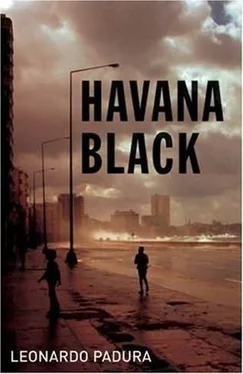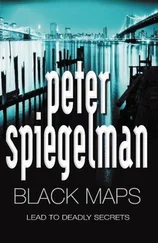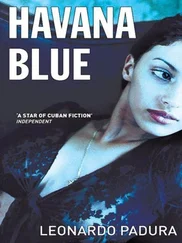“Of course, of course. Help yourself,” and he opened the small mahogany humidor on his desktop. “You know what these are? They’re a truly wonderful set of Cohibas Lanceros. I can tell you they’re the best cigars in the whole world. Go on, choose one. Take a good look, what sheen, what colour, what works of art… Beautiful, aren’t they?”
The Count studied the cigars, arrayed in strict formation in the humidor, shiny and straight-backed like healthy animals, their necks ringed, and thought how the Major’s premature retirement must be driving him mad: he never reckoned he would see the day when he’d give away a cigar of such distinction. When it came to cigars, the Boss was an eccentric connoisseur and incredibly tight-fisted.
“If you say so.” He nodded and took one of the Lanceros, the first in the set, while the Major eyed the rest and opted for one in the middle, after weighing up two or three other possibilities.
“Now be careful how you prime it,” Rangel warned when he saw him bite the end of the cigar. “That decides everything: if you don’t prime it properly, you will certainly ruin the cigar… Tell me, how do you prefer to do it? With scissors or the guillotine?”
“I don’t know, I always use my teeth, you know.”
“Fine, but wet it first so you don’t break the outer layer. Look, like this,” and he continued his lesson, moistening the cigar and twisting it between his lips, finally tweaking it like a nipple, with the delicacy of an experienced lover. “You see?”
Ana Luisa brought in a sweet infusion of unknown provenance, and after drinking it, the two men lit their havanas, the blue clouds from which perfumed the atmosphere in the library. Only then did the Count decide to speak up: “How you feeling, Boss?”
“Can’t you see? Fucked, and on boiled water, as if I had diarrhoea. But don’t worry… I won’t die from what happened. These are the risks that go with the job.”
“What damned risks? It’s a load of crap,” blurted the Count, almost choking on the smoke from his cigar. “You’re the best head of criminal investigation the country has…”
“You think so, Mario? And how do you explain the fact that several of my detectives were criminals and used their positions to further their own ends?”
“There was no reason why you should have known…”
“Yes, I ought, Mario, that much is obvious… But I never thought so many could do so much. And don’t start telling me about human nature or skeletons in the… The fact is I burned my fingers on their behalf and look,” he held out his arms, “I got singed.”
“And why did you trust someone like me?” the Count queried, hoping to hear Major Rangel bestow rare praise.
“Because I must be mad,” replied the Boss, smiling once more: he now shifted only his upper lip from the edge of the cigar. “Hey, Mario, in all these years you never once damned well told me why you joined the police. Will you tell me now?”
The Count nodded, relieved to find the Rangel he’d always known and not the defeated, crestfallen man he had imagined. He still seemed young for his age, in that tight pullover emphasising the pectorals of a practised swimmer and squash player. Not even rejection or fear of those who were once his friends and colleagues seemed overly to affect the true grit of a man born to be a policeman.
“Not right now. But I can tell you now it is down to you whether I remain a policeman or not.”
“What are you on about, Mario Conde?”
“It’s quite simple: when I heard they were kicking you out, I handed in my resignation, and now they’ll accept it if I solve just one more case. And it’s a really tasty case. But I’ll only take it on if you tell me to…”
The Boss stood up and walked over to the shutters. He looked out at the quiet street, shimmering under the midday sun, and looked at the garden, in need of some attention, and drew gently on his Cohiba Lancero.
“Mario, do me a favour,” his voice started off quite amiably but suddenly switched tone with that facility the Count had always envied, “stop talking nonsense and tell me what this tasty case is all about. Remember I was also a policeman until only three days ago. Why is it so tasty? Come on. I’m all ears.”
A single, well-aimed brutal blow had been enough to put an end to the life of Miguel Forcade Mier: like a ball angrily repelled by a powerful hitter, his brain burst inside his skull, putting an end to the ideas, memories and emotions of the man who in a moment made the transition from life to death. But then the second part of that savage sacrifice was performed: his penis and testicles were excised at the root by a clumsy, furious hand, which scored the flesh, pulled at it, sawed at it, till the entire masculinity of a man who’d returned from the beyond was severed. His body was finally thrown into that turbid sea, a possible offering to certain lethal gods, at a spot where water black with shit, urine, vomit and menstruation issued forth from the city to which Miguel Forcade had returned quite unsuspecting he would never leave it again.
The Count and Major Rangel exchanged looks of disgust: the infinite cruelty of that murder smacked of enraged sacrifice, livid revenge perhaps years in the planning and finally executed when oblivion had apparently buried for ever the unpredictable source of a hatred unleashed now like an October cyclone on the tropics.
And they thought: Miguel Forcade Mier must have died from some ancient crime; perhaps from his time as a repossessor of expropriated goods, when so much wealth abandoned by the Cuban bourgeoisie running for cover with such a hue and cry was confiscated in the name of the people and its government, who should now own everything. Furniture, jewels, works of art, coins ancient and modern, accumulated over more than two centuries by a dialectically defeated social class, had now to pass through the hands of the Official Expropriator charged with the mission of assigning them a more just destiny. Would he always do that? Logic began to suggest not: the bewildering temptations offered by those historically doomed fortunes might have corrupted the vanguard ideology of the man who almost thirty years later, the sign of a traitor cut into his forehead, would die castrated. One could imagine that a part of those recycled riches, minimal no doubt but very valuable (say a Degas that never reappeared, a Greek amphora lost to an oblivious Mediterranean, a Roman bust lost to memory, or collection of Byzantine coins never again exchanged by merchant owners of every temple there ever was?), passed through his hands with the promise of a revolutionary redistribution that never happened and that he perhaps finally paid for in that death of blood, wood and iron… But, why was it necessary to castrate him?
Although the crime may not have been that distant or remarkable, perhaps it was no less forgettable for a memory perversely trapped by the physical or moral consequences of that sin: Miguel Forcade Mier had later climbed the ladder of power via the technocratic route, under the hospitable shadow of five-year plans imported from Asian steppes littered with efficient kolkhoses and sovkhoses – neither the Count nor the Major could remember the difference – infallible German Democratic economic organization, so perfect it seemed eternal, transplanted to an underdeveloped, one-crop Caribbean island that was nevertheless ready – or so it was often said – to make the great leap into a veritable socialist economic miracle… That power wielded by the National Office for Planning and the Economy was no small power: there passed through the hands of the man who would become a sexless cadaver with fish-eaten eyes decisions on trade and people’s lives, on the investment of millions and possibilities for collective and individual futures, the authority to give, to move, to place, take away and defer, from almost Olympian heights. But Miguel Forcade had leaped fatally into exile from that brilliant National Office, at the peak of its glory though soon to sink to depths of infamy, for no apparent overriding motive: they never discovered what had impelled him to defect, for he was never heard to express sentiments in public, like those usually voiced by people at his level: they always fled a dictatorship, aspired to freedom and democracy, no longer wished to be accomplices, now they had seen… And how did he ruin the life of whoever at the time, so ruthlessly his victim never found the peace of oblivion or balm of forgiveness?
Читать дальше











